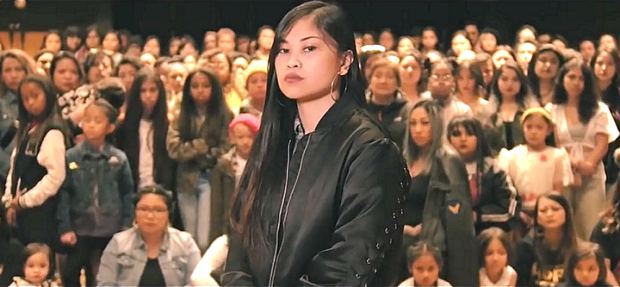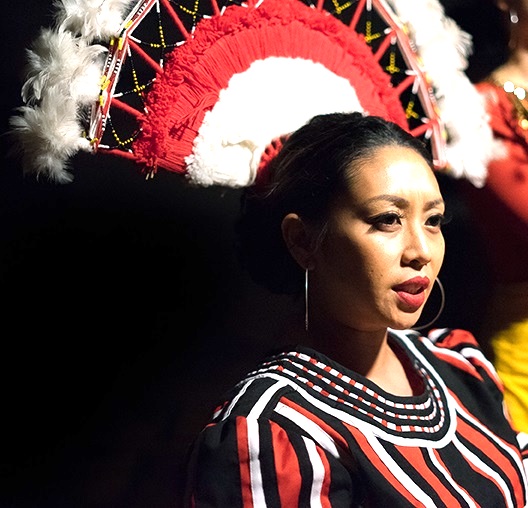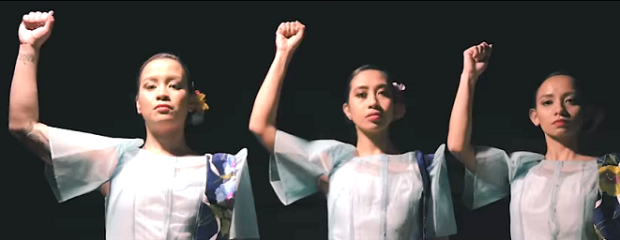Fil-Am women rappers: When younger sisters turn out better than you

Rapper Ruby Ibarra and Fil-Am women in many shades of brown. YOUTUBE
NEW YORK — “You have to set a good example,” my mom used to tell me. “Whatever you do, your sisters will follow.”
I am the oldest of four girls. We are all grown up now. I am 44. Carla, the youngest, is 34. I don’t know if my sisters cared about what I did when we were younger or if they looked up to me. But I definitely felt the pressure.
Last March, during International Women’s Day, Filipina American rappers from the West Coast, Ruby Ibarra, Rocky Rivera, Klassy, and spoken word artist Faith Santilla, released the music video of the song “Us.”
The song was released with Ruby Ibarra’s autobiographical album, Circa ‘91 in October 2017.
I listened to Francis Magalona, who was one of Ruby Ibarra’s early influences, in the early 90s when I lived in Manila. He was the only rapper I truly liked. In the early 2000s, I tried to listen to rap again after my European American husband and I got married. We met in grad school in New York. He likes Public Enemy; he finds rap soothing. I know, go figure. I found it crass and full of gratuitous profanity.

When I watched the video of “Us,” however, I couldn’t help but watch it again and again. I sent it to friends. Writers of color often talk about how representation in media is important. I know it, but the experience of seeing a hundred fellow Filipino American women in our many shades of brown, hearing the invigorating beat, and seeing them dance in the Philippines’ many colorful regional clothing was an emotional experience. It was like witnessing my younger sisters win the Grammys.
Our younger sisters
Ruby Ibarra, the rapper and the visionary director of the “Us” was born in Tacloban in 1988. Her family moved to California when she was four. She works as a scientist during the week. She studied biochemistry and molecular biology at University of California Davis and then raps in English, Tagalog, and Waray during the weekends.
“November 1991, papa came here with a wife Two daughters, no money, but they wanted them a better life Piso to their name, so they piecing up the pain Ain’t no peace in a position as an immigrant that’s prayin’ For a piece of that Americana pie or for the C.R.E.A.M“– From Ruby Ibarra’s ‘7,000 Miles,’ Circa ‘91
Rocky Rivera, whose real name is Krishtine De Leon, studied journalism at San Francisco State University. She was born in the Philippines in the early ‘80s and was an accomplished music journalist before she became a rapper. Her work has appeared in The Source and Rolling Stone Magazine. Her nom de guerre is from Jessica Hagedorn’s 1997 novel, “Gangster of Love”, a novel about a Filipino American poet turned music artist.

Rocky Rivera, whose real name is Krishtine De Leon, is a rapper and a music journalist. YOUTUBE
Incidentally, Nom De Guerre is the title of one of Rocky Rivera’s albums which contains one of my favorite songs of hers, “Brown Babies.” When not performing, Rocky Rivera is also a mother of two and a youth educator to teens in Oakland, California.
Klassy or Graciela Moreno is the youngest of the performers. She was born in 1996 and moved to California with her family when she was 2. She has a beautiful singing voice but prefers rap. Listen to her rap in Tagalog on YouTube. Klassy is barely 5 feet tall but in her YouTube clips and in the “Us” video, she delivers her message with a burning stare, that you cannot help but pay attention.
The video also introduces to us Faith Santilla, who was born in the late ‘70s. Faith is an award-winning poet, writer, and community organizer. Her work has been cited in books, such as Legitimizing Empire: Filipino American and US Puerto Rican Cultural Critique,published by University of Illinois Press in 2015 and Transnational Crossroads: Remapping Asia and the Pacific,published by the University of Nebraska Press in 2012. She is a member of AF3IRM, formerly the Gabriela Network.
One down, one fall
In the video, you hear the four women call, “Isang bagsak!” Although I grew up in the Philippines, I did not know the history of our unity clap. Our sisters’ video led to me learn its history. Filipino and Latino activists ended their United Farm Workers meetings in the 1960s with “Isang bagsak!” In the 1970s, anti-Martial Law activists also used it as a rallying call. In Tagalog, it translates to “one fall.” For our brothers and sisters who use it, it is a message of unity— we rise and fall together.
I was born in 1974. I was not yet born when President Marcos declared Martial Law in 1972 and only 11 years old when the Marcos family left in 1986, but I did get the message implicitly that when you talked about politics you had to watch what you say. Because we were the first to grow up with democracy after the end of Marcos’ 21-year rule, I felt that my generation was expected to lead the Philippines out of cronyism and poverty. I left when I was 22 to go to graduate school in New York City and decided to stay.

In “Us,” a music video reminding us of our roots. YOUTUBE
I know many other Filipinos who left the country in the ‘90s to seek greener pastures. And I know many others as well who have chosen to stay and serve and do the best that they can. Watching Ruby Ibarra, Rocky Rivera, Klassy, and Faith Santilla, who have followings in the United States and in the Philippines, who did not experience what it was like to live under martial law, and did not even spend their growing up years in the Philippines, is like seeing your younger sister win a Grammy award when it was supposed to be you. Someone who grew up in the Philippines, from my generation, I thought would be the one calling us brown women and men to rise and be part of a movement for change.
Isn’t it ironic that the daughters of the families who could not see a future in the Philippines are the ones who are reminding us of our roots and are calling us to come together?
It seems that we who grew up in the Philippines have taken our rich history for granted.
Since the video of “Us” was released I have been following the four on social media. I love that they practice what they preach. They are all politically active in their communities in California. (I had no idea that the sunshine state had such an energetic Filipino American music scene.) I have also been listening to their music and poetry. If you don’t live in California, you can find them in YouTube, iTunes, Bandcamp, Spotify. There is a lot of swearing and uncomfortable truths, but you will also find our beautiful stories.
As the U.S. mainstream media, the main source of the world’s stories, is opening up to narratives of people of color, our younger sisters, are part of the movement that is leading the way. This time it is our turn to follow. © The FilAm 2018

